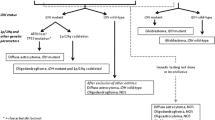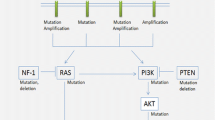Abstract
Introduction
In this study, we investigated the prognostic and predictive value of MGMT promoter methylation and protein expression in 30 pediatric high grade gliomas (pHGG).
Methods
MGMT promoter methylation was assayed by methylation-specific polymerase chain reaction (MSP), whereas MGMT protein expression was evaluated by immunohistochemistry (IHC).
Results
MGMT promoter methylation was observed in 7/24 (30%) cases, whereas MGMT protein overexpression was found in 19/28 (68%) cases with similar distribution in grade III and grade IV gliomas. Median survival of methylated and unmethylated patients was 16 and 8 months, respectively. Moreover, overall survival and progression-free survival showed a trend toward reduction in patients with unmethylation (p = 0.9 and p = 0.7, respectively). For MGMT protein expression, the median survival was 8.5 and 17 months for patients with MGMT overexpression or low expression, respectively. Although these two groups did not show statistically significant differences in terms of overall survival or progression-free survival (p = 0.8 and p = 0.7, respectively), there was a significant correlation between MGMT protein expression and MGMT promoter methylation status (p = 0.01).
Conclusions
Our findings indicate that, in pHGG, (a) MGMT promoter methylation is less frequent than in adult malignant gliomas, (b) there is a high correlation between MGMT MSP and MGMT IHC, and (c) as in adults, MGMT status is associated with prognosis, although this observation has to be statistically validated on larger series of patients.




Similar content being viewed by others
References
Kaatsch P, Rickert CH, Kühl J, Schüz J, Michaelis J (2001) Population-based epidemiologic data on brain tumors in German children. Cancer 15:3155–3164
Haque T, Faury D, Albrecht S, Lopez-Aguilar E, Hauser P, Garami M, Hanzély Z, Bognár L, Del Maestro RF, Atkinson J, Nantel A, Jabado N (2007) Gene expression profiling from formalin-fixed paraffin-embedded tumors of pediatric glioblastoma. Clin Cancer Res 13:6284–6292
Rickert CH, Sträter R, Kaatsch P, Wassmann H, Jürgens H, Dockhorn-Dworniczak B, Paulus W (2001) Pediatric high-grade astrocytomas show chromosomal imbalances distinct from adult cases. Am J Pathol 158:1525–1532
Suri V, Das P, Jain A, Sharma MC, Borkar SA, Suri A, Gupta D, Sarkar C (2009) Pediatric glioblastomas: a histopathological and molecular genetic study. Neuro Oncol 11:274–280
Antonelli M, Buttarelli FR, Arcella A, Nobusawa S, Donofrio V, Oghaki H, Giangaspero F (2010) Prognostic significance of histological grading, p53 status, YKL-40 expression, and IDH1 mutations in pediatric high-grade gliomas. J Neurooncol, Feb 21. (in press)
Jakacki RI, Yates A, Blaney SM, Zhou T, Timmerman R, Ingle AM, Flom L, Prados MD, Adamson PC, Pollack IF (2008) A phase I trial of temozolomide and lomustine in newly diagnosed high-grade gliomas of childhood. Neuro Oncol 10:569–576
Villano JL, Seery TE, Bressler LR (2009) Temozolomide in malignant gliomas: current use and future targets. Cancer Chemother Pharmacol 64:647–655
Hegi E, Diserens AC, Gorlia T, Hamou MF, de Tribolet N, Weller M, Kros JM, Hainfellner JA, Mason W, Mariani L, Bromberg JE, Hau P, Mirimanoff RO, Cairncross JG, Janzer RC, Stupp R (2005) MGMT gene silencing and benefit from temozolomide in glioblastoma. N Engl J Med 10:997–1003
Esteller M, Hamilton SR, Burger PC, Baylin SB, Herman JG (1999) Inactivation of the DNA repair gene O6-methylguanine-DNA methyltransferase by promoter hypermethylation is a common event in primary human neoplasia. Cancer Res 59:793–797
Hegi ME, Diserens AC, Godard S, Dietrich PY, Regli L, Ostermann S, Otten P, Van Melle G, de Tribolet N, Stupp R (2004) Clinical trial substantiates the predictive value of O-6-methylguanine-DNA methyltransferase promoter methylation in glioblastoma patients treated with temozolomide. Clin Cancer Res 15:1871–1874
Anda T, Shabani HK, Tsunoda K, Tokunaga Y, Kaminogo M, Shibata S, Hayashi T, Iseki M (2003) Relationship between expression of O6-methylguanine-DNA methyltransferase, glutathione-S-transferase pi in glioblastoma and the survival of the patients treated with nimustine hydrochloride: an immunohistochemical analysis. Neurol Res 25:241–248
Brell M, Tortosa A, Verger E, Gil JM, Viñolas N, Villá S, Acebes JJ, Caral L, Pujol T, Ferrer I, Ribalta T, Graus F (2005) Prognostic significance of O6-methylguanine-DNA methyltransferase determined by promoter hypermethylation and immunohistochemical expression in anaplastic gliomas. Clin Cancer Res 11:5167–5174
Donson AM, Addo-Yobo SO, Handler MH, Gore L, Foreman NK (2007) MGMT promoter methylation correlates with survival benefit and sensitivity to temozolomide in pediatric glioblastoma. Pediatr Blood Cancer 48:403–407
Pollack IF, Hamilton RL, Sobol RW, Burnham J, Yates AJ, Holmes EJ, Zhou T, Finlay JL (2006) O6-methylguanine-DNA methyltransferase expression strongly correlates with outcome in childhood malignant gliomas: results from the CCG-945 cohort. J Clin Oncol 24:3431–3437
Preusser M, Charles Janzer R, Felsberg J, Reifenberger G, Hamou MF, Diserens AC, Stupp R, Gorlia T, Marosi C, Heinzl H, Hainfellner JA, Hegi M (2008) Anti-O6-methylguanine-methyltransferase (MGMT) immunohistochemistry in glioblastoma multiforme: observer variability and lack of association with patient survival impede its use as clinical biomarker. Brain Pathol 18:520–532
Acknowledgments
This study was in part supported by “Associazione Italiana per la Ricerca sul Cancro AIRC” and “Il Fondo di Giò Onlus”. Manila Antonelli is supported by a grant from Associazione Italiana per la Lotta al Neuroblastoma. We thank Maria Luisa Garrè for assistance with the clinical information and Alessandra Angiolosanto for technical assistance.
Author information
Authors and Affiliations
Corresponding author
Rights and permissions
About this article
Cite this article
Buttarelli, F.R., Massimino, M., Antonelli, M. et al. Evaluation status and prognostic significance of O6-methylguanine-DNA methyltransferase (MGMT) promoter methylation in pediatric high grade gliomas. Childs Nerv Syst 26, 1051–1056 (2010). https://doi.org/10.1007/s00381-010-1191-1
Received:
Accepted:
Published:
Issue Date:
DOI: https://doi.org/10.1007/s00381-010-1191-1




